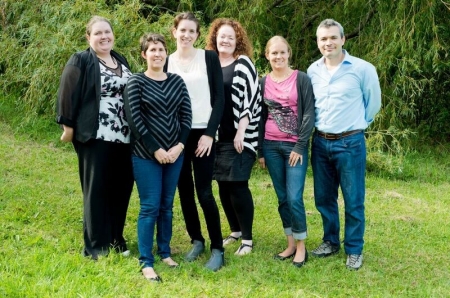Bailey, J. S., & Virues-Ortega, J. (2019). Análisis de escenarios éticos prácticos planteados por analistas de conducta de habla hispana [Analysis of practical ethical scenarios suggested by Spanish-speaking behavior analysts], in J. Virues-Ortega (Ed. & Trans.), Ética para Analistas de Conducta, 3ra. ed. (pp. 322-338). doi:10.26741/abaspain/2019/Bailey21
Bailey, J. S., & Burch, M. R. (2019). Ética para analistas conductual [Ethics for behavior analysts 3rd ed.] (J. Virues-Ortega Ed. & Trans.). doi:10.26741/abaspain/2019/Bailey ISBN 978-84-09-07803-5
Cooper, J. O., Heron, T. E., & Heward, W. L. (2017). Análisis aplicado de conducta [Applied Behavior Analysis] (J. Virues-Ortega Ed. & Trans.). doi:10.26741/abaspain/2017.cooper
Cox, A. D., Virues-Ortega, J., Julio, F., & Martin., T. L. (2017). Establishing steadiness in children with autism and intellectual disability: Applications for anatomical and functional MRI. Journal of Applied Behavior Analysis, 50, 8-26. doi:10.1002/jaba.351
Cox, A. D., & Virues-Ortega, J. (2016). A review of how psychotropic medication can affect the motivation of challenging behaviour. International Journal of Developmental Disabilities, 62, 192-199. doi:10.1080/20473869.2016.1175157
Cox, A. D., & Virues-Ortega, J. (2015). Interactions between behavior function and exposure to psychotropic drugs. Journal of Applied Behavior Analysis, 48, 1-20. doi:10.1002/jaba.247
Garcia, M. T., Virues-Ortega, J., Smith, S., & Moussavi, Z. (2013). Effect of cognitive training targeting associative memory in the elderly: A small randomized trial and a longitudinal evaluation. Journal of the American Geriatrics Society, 61, 2252-2255. doi:10.1111/jgs.12574
Hurl, K., Wightman, J. K., Haynes, S. N., & Virues-Ortega, J. (2016). Does a pre-intervention functional assessment increase intervention effectiveness? A meta-analysis of within-subject interrupted time-series studies. Clinical Psychology Review, 47, 71-84. doi:10.1016/j.cpr.2016.05.003
Keenan, M., Dillenburger, K., Röttgerset, H. R., Dounavi, K., Jónsdóttir, S. L., Moderato, P., Schenk, J. J. A. M., Virues-Ortega, J., Roll-Pettersson, L., & Martin, N. (2015). Autism and ABA: The gulf between North America and Europe. Review Journal of Autism and Developmental Disorders, 2, 167-183. doi:10.1007/s40489-014-0045-2
McCormack, J., Elliffe, D., Virues-Ortega, J. (in press). Quantifying the effects of the differential outcomes procedure in humans. Journal of Applied Behavior Analysis.
Nogales-González, C., Virues-Ortega, J., & Marquez-Gonzalez, M. (2016). Psicoterapia Analítico Funcional. In M. Marquez-Gonzalez (Ed.), Tendencias Actuales en Intervención Psicológica (pp. 97-128). Madrid, Spain: Editorial Síntesis. ISBN 978-84-9077-284-3
Pelaez, M., Virués-Ortega, J., Amir, Y., Schnerch, G., & Field, T. (2013). Acquisition of social referencing in infants of mothers with depressive symptoms. Infant Behavior and Development, 36, 548-556. doi:10.1016/j.infbeh.2013.05.003
Phillips, K. J., & Mudford, O. C. (2011). Effects of noncontingent reinforcement and choice of activity on aggressive behavior maintained by attention. Behavioral Interventions, 26, 147-160. doi:10.1002/bin.329
Phillips, K. J., Mudford, O. C., Zeleny, J. R., & Elliffe, D. E. (2014). Using Calibration and Interobserver agreement algorithms to assess the accuracy and precision of data from electronic and pen-and-paper continuous recording methods. Behavioral Interventions, 29, 315-330. doi:10.1002/bin.1395
Plantiveaou, C., Dounavi, K., Virues-Ortega, J. (2018). High levels of burnout among early-career Board-Certified Behavior Analysts with low collegial support. European Journal of Behavior Analysis, 19, 195-207. doi:1080/15021149.2018.1438339
Querim, A., Iwata, B., Roscoe, E., Schlichenmeyeer, K., Virués-Ortega, J., Hurl, K. (2013) Functional analysis screening for problem behavior maintained by automatic reinforcement. Journal of Applied Behavior Analysis, 46, 47-60. doi:10.1002/jaba.26
Sharp, R. A., Phillips, K. J., & Mudford, O. C. (2012). Comparisons of interventions for rumination maintained by automatic reinforcement. Research in Autism Spectrum Disorders, 6, 1107-1112. doi:10.1016/j.rasd.2012.03.002
Tam, G. M., Phillips, K. J., & Mudford, O. C. (2011). Teaching individuals with profound multiple disabilities to access preferred stimuli with multiple microswitches. Research in Developmental Disabilities, 32, 2352-2361. doi:10.1016/j.ridd.2011.07.027
Taylor, S. A., & Mudford, O. C. (2012). Improving behaviour in a residential service for youth in drug and alcohol rehabilitation. Behavioral Interventions, 27, 109-128. 10.1002/bin.1342
Taylor, S. A., Anderson, K., & Mudford, O. C. (2010). Effects of textual response prompts for adolescents in a substance abuse treatment program. Behavioral Interventions, 25, 145-155. doi:10.1002/bin.303
Taylor, S. A., Mudford, O. C., & Phillips, K. J. (2011). Training employment acquisition skills for adolescents with a substance abuse history. Behavioral Interventions, 26, 282-308. doi:10.1002/bin.338
Taylor, S. L., Purdy, S., Jackson, B., Phillips, K., & Virues-Ortega, J. (2019). Evaluation of a home-based Behavioral treatment model for children with tube dependency. Journal of Pediatric Psychology. doi:10.1093/jpepsy/jsz014
Virues-Ortega, J. Arnold-Saritepe, A., Hird, C., & Phillips, K. (2017). The TEACCH program for people with autism: Elements, outcomes, and comparison with competing models. In J. L. Matson (Ed.), Handbook of Treatments of Autism Spectrum Disorder. New York: Springer. doi:10.1007/978-3-319-61738-1
Virues-Ortega, J., Lehnert, K., Swan, B., Taylor, M.W., Southee, A., Dougan, D., Taylor, J., Hille, R., Snell, R.G., & Jacobsen, J.J. (2017). The New Zealand Minds for Minds Autism Spectrum Disorder Self-Reported Cohort. Accepted for publication at Research in Autism Spectrum Disorder, 36, 1-7. doi: 10.1016/j.rasd.2016.12.003
Virues-Ortega, J., & Cox, A. D. (2016). Animal-assisted therapy for older adults, in S. K. Whitbourne (Ed)., The Encyclopedia of Adulthood and Aging (Vol. 1, pp. 69-73). New York: Wiley & Sons. doi: 10.1002/9781118521373.wbeaa139
Virues-Ortega, J., Pear, J. J., Boris, A. L., Cox, A. D., Hu, L., Julio, F. M., Michalyshyn, C. A., & Wightman, J. K. (2016). Single-subject research design. In H. L. Miller, The SAGE Encyclopedia of Theory in Psychology (pp. 859-862). New York: Sage. doi:10.4135/9781483346274.n293
Virues-Ortega, J., & Frojan-Parga, M. X. (2015). A translational approach to the functional analysis of language in psychotherapy. International Journal of Clinical and Health Psychology, 15, 69-75. doi:10.1016/j.ijchp.2014.10.001
Virués-Ortega, J., & Pear, J. J. (2015). A history of “behavior” and “mind”: A systematic analysis of the use of behavioral and cognitive terms during the 20th Century. The Psychological Record, 65, 23-30. doi:10.1007/s40732-014-0079-y
Virues-Ortega, J., Martin, N., Schnerch, G., Miguel-Garcia, J. A., & Mellichamp, F. (2015). A general methodology for the translation of behavioral terms into vernacular languages. The Behavior Analyst, 38, 127-135. doi:10.1007/s40614-014-0025-y
Virues-Ortega, J., & Pear, J. J. (2015). A history of “behavior” and “mind”: A systematic analysis of the use of behavioral and cognitive terms during the 20th Century. The Psychological Record, 65, 23-30. doi:10.1007/s40732-014-0079-y
Virues-Ortega, J., Hurtado-Parrado, J., Cox, A. D., & Pear, J. J. (2014). A systematic analysis of the interaction between experimental and applied behavior analysis. Journal of Applied Behavior Analysis, 47, 1-24. doi:10.1002/jaba.124
Virués-Ortega, J., Hurtado-Parrado, J., Cox, A. D., & Pear, J. J. (2014). A systematic analysis of the interaction between experimental and applied behavior analysis. Journal of Applied Behavior Analysis, 47, 1-24. doi:10.1002/jaba.124
Virués-Ortega, J., Iwata, B. A., Fahmie, T., Harper, J. (2013). Effects of alternative responses on behavior exposed to noncontingent reinforcement. Journal of Applied Behavior Analysis, 46, 603-612. doi:10.1002/jaba.61
Virues-Ortega, J., Julio, F., & Pastor, R. (2013). The TEACCH program for children and adults with autism: A meta-analysis of intervention studies. Clinical Psychology Review, 33, 940-953. doi:10.1016/j.cpr.2013.07.005
Virues-Ortega, J., Martin, N., Schnerch, G., Miguel-Garcia, J. A., & Mellichamp, F. A general methodology for the translation of behavioral terms into vernacular languages. The Behavior Analyst, 38, 127-135. doi:10.1007/s40614-014-0025-y
Virués-Ortega, J., Pritchard, K., Grant, R. L., North, S., Hurtado-Parrado, C., Lee, M., Temple, B., Julio, F. M., & Yu, C.T. (2014). Clinical decision-making and preference assessment for individuals with intellectual and developmental disabilities. American Journal on Intellectual and Developmental Disability, 119, 151-170. doi:10.1352/1944-7558-119.2.151
Virués-Ortega, J., Rodríguez, V., & Yu, C. T. (2013). Prediction of treatment outcomes and longitudinal analysis in children with autism undergoing intensive behavioral treatment. International Journal of Clinical and Health Psychology, 13, 91-100. doi:10.1016/S1697-2600(13)70012-7
Wightman, J., Julio, F., & Virués-Ortega, J. (2014). Advances in the functional analysis and treatment of problem behavior. Psicothema, 26, 186-192. doi:10.7334/psicothema2013.142






